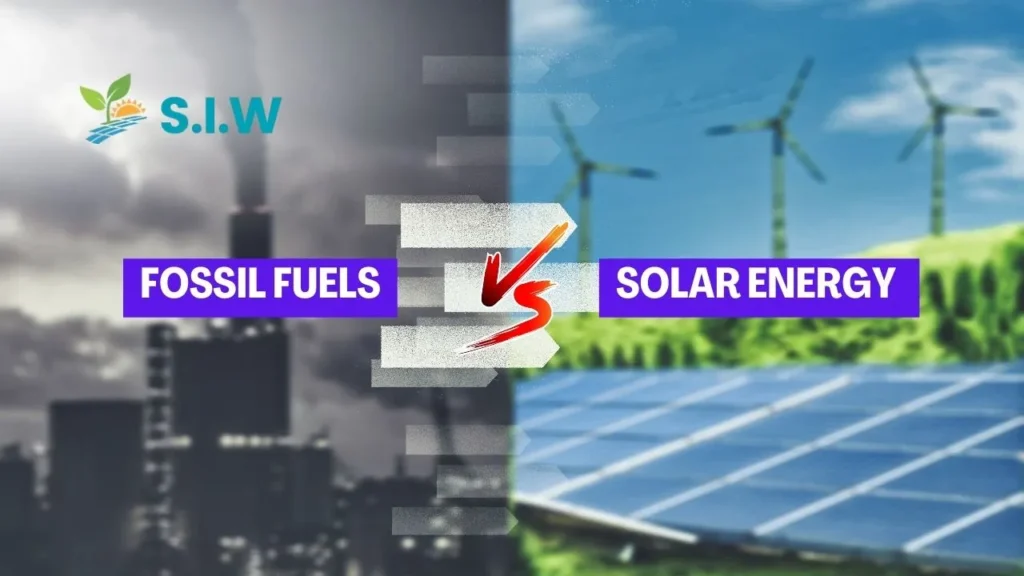In the ongoing global conversation surrounding energy sources, the comparison between solar energy and fossil fuels continues to be at the forefront. As environmental concerns grow, the need to transition to more sustainable energy solutions becomes increasingly pressing. Both solar energy and fossil fuels power industries, homes, and cities, but their environmental impact, cost, availability, and long-term feasibility differ greatly.
What are Solar Energy and Fossil Fuels?
Solar Energy
Solar energy is harnessed from the sun’s radiation and converted into electricity or heat. Photovoltaic (PV) panels absorb sunlight and generate electricity, while solar thermal systems convert solar radiation into heat for water heating and other applications. As a renewable source, solar energy is naturally replenished and widely available, with advancements in technology making it more accessible and efficient.
Fossil Fuels
Fossil fuels, including coal, natural gas, and oil, are non-renewable energy sources that are derived from the decomposed remains of ancient plants and animals over millions of years. These fuels have been the backbone of industrialization, powering most of the world’s electricity grids, transportation systems, and industrial processes. However, their extraction and combustion release harmful greenhouse gases, contributing to climate change.
Key Differences: Solar Energy vs Fossil Fuels
1. Environmental Impact
Solar Energy
Solar energy has a significantly lower environmental footprint compared to fossil fuels. The generation of electricity from solar panels produces no emissions during operation, making it a clean energy source. Additionally, solar farms can be installed on rooftops, reducing land use concerns, and they operate quietly, unlike fossil fuel power plants. However, there are environmental impacts associated with the production of solar panels, particularly in mining materials like silicon and rare metals.
Fossil Fuels
Fossil fuels are a major contributor to air and water pollution. The combustion of coal, oil, and natural gas releases carbon dioxide (CO2) and other greenhouse gases, driving global warming and contributing to climate change. Extraction processes like mining and drilling can result in deforestation, habitat destruction, and oil spills, further harming ecosystems. The use of fossil fuels is also responsible for smog, acid rain, and harmful particulates in the air.
2. Cost Efficiency and Economic Impact
Solar Energy
The cost of solar energy has dropped significantly in recent years, with advancements in technology making it one of the most affordable renewable energy sources. The initial investment in solar panels and installation can be high, but this cost is offset by savings on electricity bills and government incentives. Over time, solar energy proves to be more cost-effective as sunlight is free, and maintenance costs are minimal. Additionally, solar energy creates local jobs in installation and maintenance, boosting local economies.
Fossil Fuels
Fossil fuels have been a historically cheaper energy source, especially in regions rich in natural resources. However, the fluctuating prices of oil and gas, combined with the increasing costs of environmental damage, make fossil fuels less economically stable in the long term. Additionally, fossil fuel industries are highly subsidized by governments, masking the true cost of extraction, pollution, and health impacts. The economic reliance on fossil fuels is also a risk, as the world moves towards decarbonization and renewable energy.
3. Energy Availability and Reliability
Solar Energy
Solar energy is abundant and virtually inexhaustible. Every hour, enough sunlight reaches the Earth to meet global energy needs for an entire year. However, solar energy generation depends on geographic location, time of day, and weather conditions. Cloudy days and nighttime limit the amount of solar power generated, though technological solutions like energy storage systems (batteries) and grid integration help address these challenges.
Fossil Fuels
Fossil fuels are reliable and can provide energy continuously, unlike solar energy, which is intermittent. Power plants fueled by coal, oil, or natural gas can operate around the clock, providing a stable energy supply. However, fossil fuels are finite, and their reserves are depleting. As extraction becomes more difficult, energy production costs will rise, and reliability could become an issue as global supply diminishes.
Long-Term Sustainability
Solar Energy
Solar energy is a long-term sustainable energy solution. As a renewable resource, it can continue to supply power without depletion. The sun is expected to continue burning for billions of years, ensuring a long-term energy source. Furthermore, advancements in solar panel efficiency, energy storage, and grid integration make solar energy increasingly viable for powering entire regions.
Fossil Fuels
Fossil fuels, in contrast, are non-renewable. Once depleted, they cannot be replenished on a human timescale. Current estimates suggest that oil, natural gas, and coal reserves could run out within the next century if current consumption trends continue. The environmental damage and health impacts caused by fossil fuel use also make it an unsustainable energy choice for the future.
Solar Energy’s Growing Role in Global Energy Markets
As global demand for energy grows and climate change mitigation becomes a priority, solar energy is becoming a key player in the energy mix. Countries around the world are investing heavily in solar infrastructure. The International Energy Agency (IEA) projects that solar energy could be the world’s largest source of electricity by 2050, surpassing fossil fuels. Solar power’s scalability, combined with storage and smart grid technologies, makes it a flexible option for urban and rural areas alike.
Conclusion
The comparison between solar energy and fossil fuels demonstrates the clear advantages of solar power in terms of environmental impact, cost, sustainability, and long-term viability. While fossil fuels still play a significant role in powering the world today, the shift toward renewable energy is inevitable. Solar energy, with its limitless potential and declining costs, is positioned to lead the energy revolution, providing a cleaner, more sustainable future for generations to come.








